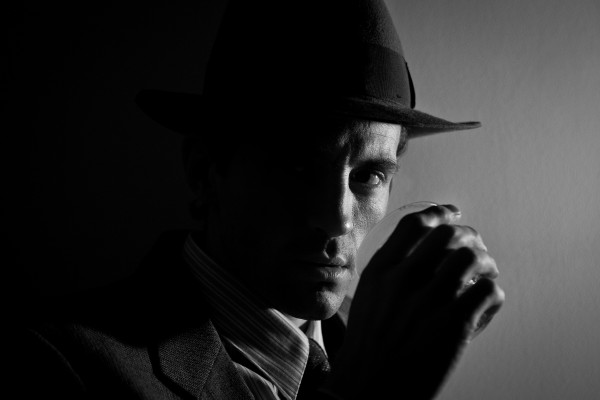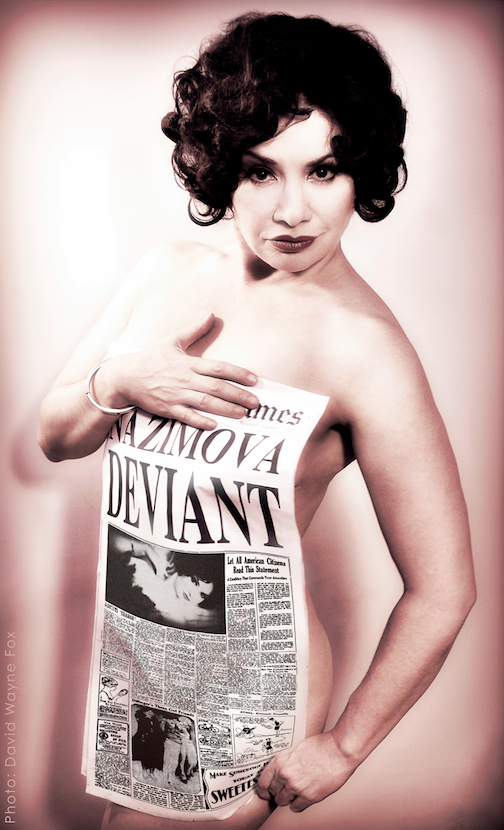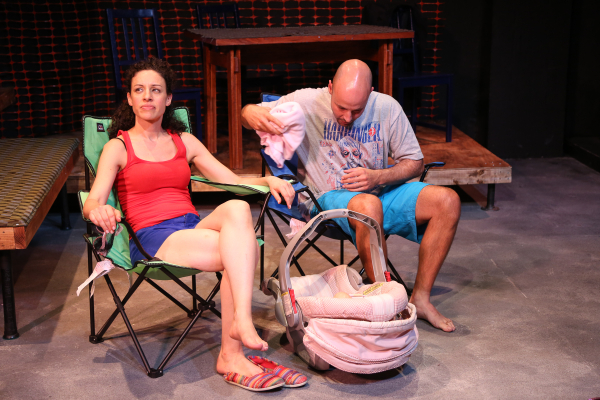Review by Samuel L. Leiter
Film noir: that black and white genre of the forties and fifties known for its chain-smoking, fedora-wearing, shoulder-holstered private eyes; low-key, heavily shadowed lighting streaming through venetian blinds; foggy-voiced, pistol-packing, femmes fatales; sarcastic, rat-a-tat dialogue; twisty, double cross-studded plots; shady, trigger-happy cops; and soundtracks oozing with moody blues and jazz.
The genre is so rich in stylistic tics it generated a raft of filmic parodies, ranging from Carl Reiner’s “Dead Men Don’t Wear Plaid” to Robert Zemeckis’s “Who Framed Roger Rabbit?” “Kill Me Like You Mean It,” a rewritten version of Kiran Rikhye’s 2006 absurdist-noir play, is in this vein. This “stage noir,” as it’s called, is once more in the hands of the Stolen Chair Theatre Company and director Jon Stancato, whose production of Rikhye’s silent film parody “The Man Who Laughs” was so memorable two seasons ago. While I wouldn’t go so far as to label it “D.O.A.,” its uneven humor may not be enough to protect some visitors from being tempted by “The Big Sleep.”
Nathan Darrow (Kevin Spacey’s stoic bodyguard on “House of Cards”) plays private investigator Ben Farrell, a Sam Spade-Philip Marlowe mashup. In a convoluted plot suggestive of something from an abandoned Dashiell Hammett-Raymond Chandler playbook, this cynical ex-gumshoe is hired, separately, by two attractive dames. One, Lydia Forsythe, is the editor of “Murder Monthly,” whose top writer, Tommy Dickie (David Skeist in the role originally played by an actor named Tommy Dickie), has gone missing and whose whereabouts Lydia wants Farrell to discover. The other is Vivian Ballantine (Sarah Skeist), Dickie’s widowed sister, who needs Farrell to find out just what’s going on between her brother and Lydia. The two jobs are intertwined with Farrell’s personal life because Dickie has been writing stories that have been coming true, and a forthcoming story about Farrell’s own imminent death—he’s called Bob Darrell in it—is too close for comfort.
What follows, as Farrell struggles through the plot’s twists and turns to prevent his own demise, offers director Stancato a chance to highlight the usual noirish clichés; some of it works, but too much is repetitive or thuddingly ham-handed. No one actually smokes in the production, for example, but, to cite a running gag, whenever Farrell is offered a cigarette he puts it over his ear, often poking one from its place to insert another. Not funny. On the other hand, there are several smartly staged sequences bordering on the choreographic, as in a dandy comic routine involving the handling of their fedoras by Farrell and a detective named Jones (Jon Froehlich). Stancato’s stylized staging extends to the many shadowy scene changes, during which men in period suits and fedoras silently shove units off and on; with so many shifts, though, it’s not long before this river has run dry.
Michael Minahan’s minimalist set, with two small bleacher areas seating around six people on either side, is dramatically lit by David Bengali, and enlivened by the mid-forties costumes of Angela Harner. Having background music playing throughout is a good idea, although Sean Cronin’s score is a thin substitute for actual movie music; it’s certainly not on the level of Eugene Ma’s “The Man Who Laughs” contribution.
While none of the performances is vaguely as charismatic or vocally potent as those of the great film noir stars (think Bogart, Mitchum, Bacall, and Stanwyck), the actors are moderately reasonable facsimiles. Unfortunately, their characters are little more than cardboard attitudes, and “Kill Me Like You Mean It” is little more than an ambitious exercise in style.
Kill Me Like You Mean It
Fourth Street Theatre
84 East 4th Street, NYC
Through March 8




















